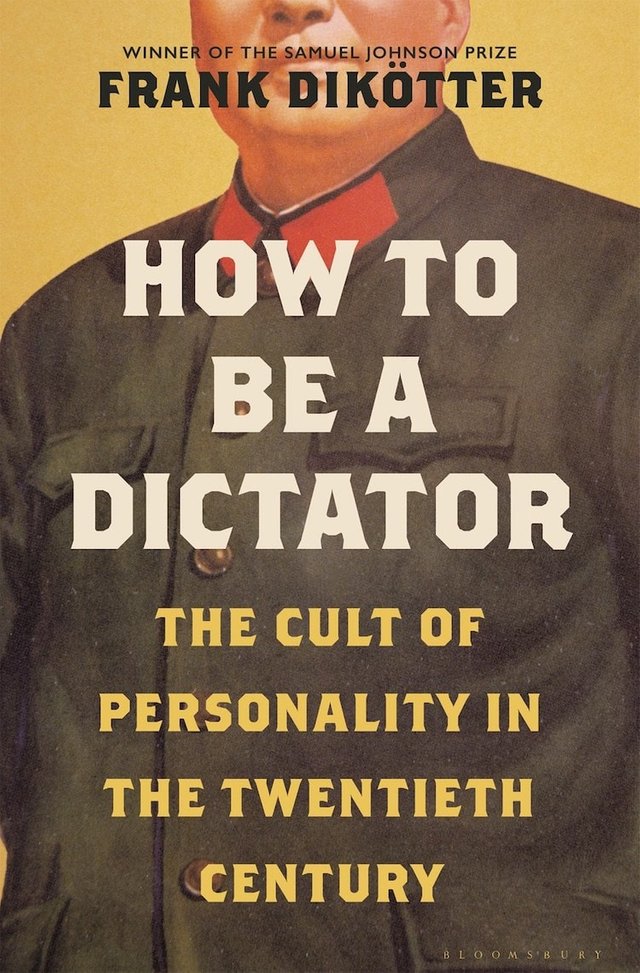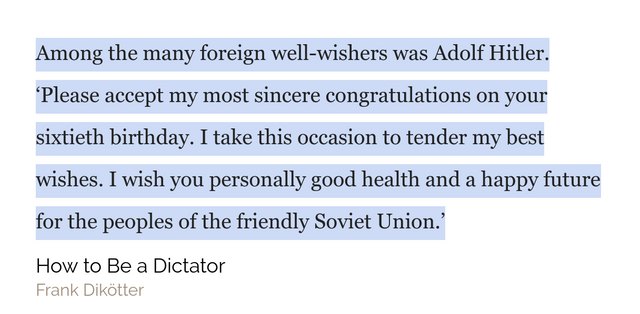
This is a collection of stories of different dictators and how they came from nowhere, tried to get big, failed, learned from it, retried, succeeded, mass killed many a person, failed, and died. That's basically it, over and over by every dictator in the book.
There were many strategies for a dictator to claw his way to power and get rid of his rivals. There were bloody purges, there was manipulation, there was divide and rule, to name only a few. But in the long run the cult of personality was the most efficient. The cult debased allies and rivals alike, forcing them to collaborate through common subordination. Most of all, by compelling them to acclaim him before the others, a dictator turned everyone into a liar. When everyone lied, no one knew who was lying, making it more difficult to find accomplices and organise a coup.
There are a lot of things that are repeated throughout the book. Most dictators in the book are ones from the 20th century, e.g. Hitler, Stalin, Il-sung, and Mao. It's interesting to read about because their strategies are now used by other dictators—or dictator wannabes—in the modern age, for example, Trump.
Dictators who lasted possessed many skills. Many excelled at hiding their feelings. Mussolini saw himself as Italy’s finest actor. In an unguarded moment Hitler, too, called himself Europe’s greatest performer. But in a dictatorship many ordinary people also learned how to act. They had to smile on command, parrot the party line, shout the slogans and salute their leader. In short, they were required to create the illusion of consent. Those who failed to play along were fined, imprisoned, occasionally shot.
There are a lot of interesting tidbits from the lives of the dictators, and they do intertwine. An example of this:
For the best part of a decade Stalin and Hitler had observed each other with a mixture of growing wariness and grudging admiration. ‘Hitler, what a great fellow!’ Stalin exclaimed after the Night of the Long Knives. Hitler, for his part, found the Great Terror deeply impressive. But Stalin had read Mein Kampf carefully, including those passages where its author promised to erase Russia from the map. ‘Never forget,’ Hitler had written, ‘that the rulers of present-day Russia are bloodstained common criminals. We are dealing with the scum of humanity.’
There are plenty of backstabbing sycophants throughout this book, most of them lending a hand in understanding that if you support an utterly corrupt demagogue who wishes to have complete control in hierarchical fashion—which is the structure for capitalist companies—you will perish; you will perhaps not go under because in a physical sense, but in a mental one.

To read of how dictators and their memory is preserved after they died is acutely interesting, as it says a lot of the ephemeral lives of dictators:
On 1 March 1953 Stalin was found lying on the floor, soaked in his own urine. A blood vessel had burst in his brain, but no one had dared to disturb him in his bedroom. Medical help, too, was delayed, as the leader’s entourage was petrified of making the wrong call. Stalin died three days later. His body was embalmed and displayed, but crowds of mourners determined to catch a last glimpse of their leader ran out of control. Hundreds were trampled to death in the ensuing panic. After an elaborate state funeral on 9 March he was laid to rest next to Lenin. Tower bells were rung and salute guns fired. Every train, bus, tram, lorry and car in the country came to a halt. Complete silence descended over Red Square. ‘A single sparrow swooped over the mausoleum,’ observed one foreign correspondent. An official announcement was made, then the flag slowly raised back to full mast. Eulogies came in from the beneficiaries of the regime, none more eloquent than those penned by Boris Polevoi and Nicolai Tikhonov, winners of the Stalin Prize. Millions grieved. One month after his funeral Stalin’s name vanished from the newspapers.
I found the parts about Hitler, Mussolini, and Ceau?escu to be the most interesting. Those guys were ultra-insane, and yet knew exactly how to manipulate (and take control over) the media. Just see how Mussolini was treated:
Great leaders also came to pay homage. Mohandas Gandhi, who visited twice, pronounced him ‘one of the great statesmen of the time’, while Winston Churchill in 1933 described ‘the Roman genius’ as ‘the greatest law-giver among living men’. From the United States alone, he received William Randolph Hearst, New York Governor Al Smith, banker Thomas W. Lamont, future vice-presidential candidate Colonel Frank Knox and Archbishop of Boston William Cardinal O’Connell. Thomas Edison called him the ‘greatest genius of modern times’ after a short meeting.
That also goes for Mao:
Mao’s cult, closely associated with Lin Biao and the People’s Liberation Army, was scaled back almost overnight. China moved even further away from the Soviet Union, turning instead towards the United States in 1972. Cities were spruced up for Nixon’s visit, with posters removed and anti-imperialist slogans toned down. Shanghai underwent a facelift. It took a small army of women to scrub out a huge slogan opposite the Peace Hotel proclaiming ‘Long Live the Invincible Thoughts of Chairman Mao’. New slogans appeared, welcoming the ‘Great Unity of the Peoples of the World’.
All signs of the Chairman were removed from window displays. Thousands of statues were dismantled, discreetly sent off for recycling. The Chairman, too, was primped and preened. His meeting with Nixon was a huge propaganda coup. The news sent shock waves around the world, as the balance of the Cold War shifted away from the Soviet Union. In Beijing, Mao gloated that the United States was ‘changing from monkey to man, not quite a man yet, the tail is still there’. He had reduced Nixon, the leader of the most powerful nation on earth, to a mere emissary seeking an imperial audience [...]
All in all, this book is interesting, enlightening, and seems very well-researched, but felt a bit repetitive towards the end. It's a good read for anyone who is keen to look into their history and for a Kardashian to take hold of their future in new ways.
Posted from my blog with SteemPress : https://niklasblog.com/?p=23795
Without a doubt this is a book that I would like to read. I think there are certain similarities between dictators. I have had to live the time of Chavez in Venezuela whom I consider was a dictator. Now I am living in the time of Maduro whom I also consider a dictator. Both ghastly characters also have "caudillos" characteristics. You have made a good review. A cordial greeting @pivic
Downvoting a post can decrease pending rewards and make it less visible. Common reasons:
Submit
Hi pivic,
Visit curiesteem.com or join the Curie Discord community to learn more.
Downvoting a post can decrease pending rewards and make it less visible. Common reasons:
Submit
Hello Hello!
Wow had never read something so deep and with such amazing wording! Congratulations
Greetings from Venezuela
Downvoting a post can decrease pending rewards and make it less visible. Common reasons:
Submit